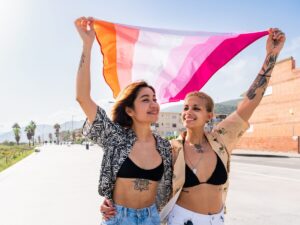Social media platforms claim to celebrate authenticity and empowerment, but for marginalised people, visibility often comes at a cost. From filters that erase identity to algorithms that reward conformity, the digital world demands self-surveillance disguised as self-expression.
Our phone screens catch us, multiple times a day, judging ourselves. We question if the angle is okay, if we will get judged, if we should post more like others or if we should post at all. Our online presence has become a curated, hypervisible extension of our bodies and minds. We are expected to maintain, monetise and morally justify. For women and marginalised people, this online self does not just live freely, it is also policed.
Surveillance doesn’t just come from governments or institutions but from peers, influencers, and our own internalised need to self-monitor. The line between who the surveyor is and who is being surveilled is increasingly blurred, and when surveillance becomes part of everyday culture, control does not need to be imposed. Surveillance becomes embedded and disguised as choice.
Content as surveillance
Academic theorists warned us that we’re not just posting, we’re participating in participatory surveillance. Every Instagram story, grid post and TikTok video becomes a gesture of soft compliance, shaped by the who we imagine is viewing it on the other side of the screen. It is imagined surveillance. Every day, we act as though someone is always watching, and it is because they often are, but not visibly, just via our screens.
Pregnant women, for instance, face a double whammy. They share their journey and are scrutinised. They are often called too big or too small, too active or too lazy, and their diets are picked apart. On the other hand, if an influencer who becomes pregnant says nothing, they are accused of vanity, secrecy, and shame. Many expectant mothers online carefully curate their content to avoid judgment while still performing idealised motherhood. It’s not just whether to share but also how to share safely.
Trans people constantly navigate whether to post pre-transition photos, if at all. Plus-size creators are expected to either shrink themselves or become full-time educators. If a plus-size creator does lose weight, they are then criticised for not being body positive and being against the ‘movement’. Consider disabled content creators who must navigate complex expectations online. Too “inspirational” and they become inspiration porn for non-disabled viewers. Too candid about struggles and they risk being labelled “negative”. In each case, surveillance shows up as a question: Am I allowed to take up space here?
The filter is political
Beauty filters are not neutral tools. They’re ideological tools. They completely flatten individuality and reward conformity by smoothing skin, narrowing noses and lightening eyes. They tell you what kind of face is acceptable and what kinds should be erased. They’re also deeply racialised, misogynistic and ableist. Popular filters routinely lighten dark skin, sharpen features toward Eurocentric ideals, and remove markers of age or disability. Ethnic features are “corrected” and queer aesthetics are sanded down into soft femininity or palatable masc energy. The filters are not just fun, and they are not neutral choices. They push specific values about which bodies and faces deserve visibility.
Apps like BeReal and Snapchat often market themselves as platforms of authenticity but even that authenticity is curated. Instagram started as a photo-sharing up and quickly became the prime spot for influencers and unrealistic standards of life and beauty. The expectation to be “real” becomes another performance that still conforms to aspirational standards. You’re expected to be raw, but not messy, and for some, remain brand-safe.
Postfeminist media culture, a term describing the shift of feminist ideals into aesthetic choices, sells empowerment through control. As Andrea M. Weare, in Beautytube (2023), outlines, this culture says you contour because you choose to. You restrict food because it’s discipline. You epilate and smile because it’s self-care. You get permanent beauty procedures because it’s empowerment. These aren’t free choices, they’re algorithmically enforced norms.
Capitalism loves your insecurities
Almost all of our insecurities are manufactured by capitalism. From our faces needing to look a certain way so we buy certain products or procedures to our bellies needing to be consistently flat so we buy obscure supplements and take part in 30-day challenges with ad revenues. Almost as if there is a miracle right on cue, a serum, a detox plan, or a “feminist” brand selling empowerment in a bottle will show up straight away, sold by a filtered face and a TikTok affiliate link.
Even our activism gets monetised. Brands posted black squares for #BLM while underpaying Black women behind the scenes. Companies like Amazon expressed solidarity with Black communities during the George Floyd protests, while their working conditions disproportionately harmed Black employees. L’Oréal Paris posted “Speaking out is worth it” in support of racial justice after having dropped model Munroe Bergdorf in 2017 for speaking out against racism. Fast fashion brands like H&M and ASOS released feminist t-shirts manufactured by underpaid women in unsafe factories.
Influencers, corporations, and wellness gurus all thrive in this loop. The more they make you doubt yourself, and make you believe they support the same thing as you, the more they encourage you to spend. This isn’t community, empowerment or liberation. It is simply feeding back into the capitalist machine that caused the insecurities in the first place.
Dove’s “Real Beauty” campaign is also a prime example of this. While celebrating diverse bodies and natural beauty, Dove’s parent company, Unilever, markets Fair & Lovely skin-lightening creams in South Asia and owns Axe, a brand built on hypersexualised advertising. The same corporation profits from both making women feel insecure and “empowering” them to overcome that insecurity. These campaigns don’t challenge beauty standards; they just expand the range of bodies that can be controlled via social media.
Online culture means we are constantly selling ourselves. Our trauma and identities turn into content and clicks, and therefore conversion rates. It is not just individuals doing the selling, it is the algorithm deciding whose bodies are visible and whose are shadowbanned. Personal identity has become something to be sold, surveilled, and exploited.
On top of this, the rise of pro-ana content is being pushed via “what I eat in a day” videos showcasing dangerously low caloric intake, “body checking” disguised as outfit posts, and “healthy lifestyle” content that promotes extreme restriction while maintaining plausible deniability. These communities use deliberately misspelt hashtags, create seemingly “aesthetic” content featuring bones and extremely thin bodies, and embed triggering messaging within wellness content. One creator might share “accountability” posts tracking weight loss, while another offers “motivation” through subtle before-and-after transformation videos, all carefully crafted to avoid detection while still signalling to those seeking this content. Products such as apple cider vinegar, bloating supplements, and at-home unregulated workout equipment can then be sold via these videos. This isn’t just a failure of content moderation, it’s a feature of surveillance capitalism, where our most vulnerable states become assets.
Far Right Pipeline
Social media platforms are not neutral, and the culture they foster isn’t accidental; algorithms can funnel users down far-right pipelines. When we’re constantly surveilled, told how to look, how to eat, and how to behave, social media becomes a powerful tool of control and a gateway for recruitment into harmful ideologies.
Fitness influencers talk about “discipline,” “order,” and “self-mastery”. These are all terms that easily blur into red pill rhetoric. The ‘alpha’ male creator preaching hypertrophy and protein often drips into dominance, hierarchy, and misogyny. It’s a gateway to the ‘manosphere’. The aesthetics aren’t only masculine. Women are recruited through soft-focus homemaking content and “feminine energy” trends. The vibe is all “tradwife”, modesty, sourdough baking, and “restoring femininity”. But underneath is a rejection of feminism, multiculturalism, and queerness.
Even the rising trend of tattoo removal, once seen as personal rebranding, has been co-opted. Some creators frame it as aesthetic cleansing, but embedded in this is a quiet call to return to “purity.” The rhetoric often echoes white nationalist ideals of returning to a blank slate, purging visible signs of rebellion, queerness, or “degeneracy”. It’s fascism in a filter where entire online subcultures still uphold Eurocentric beauty standards while pretending it’s about “class.”
And it’s no accident that this content gets traction. Algorithms don’t reward neutrality, they reward engagement, which means pushing content that polarises. Platforms push these aesthetics because they’re clickable.
Reclaiming our social media doesn’t mean logging off forever. We need resistance through intentional presence and by taking back authorship over how we’re seen and who we are allowing to see us. Sometimes it’s just posting a makeup-free selfie or posting raw, unfiltered content. No apologetic references to insecurities and no justifications for experiencing joy. That’s a political act because refusing to curate yourself for mass consumption directly challenges the system that profits from your self-doubt.
This resistance becomes especially powerful for those historically erased, flattened, or commodified online: fat bodies, queer bodies, trans bodies, disabled bodies, and Black and Brown bodies. Reclaiming online culture means showing up as your full self and rejecting the pressure to transform your life into clickbait.
The algorithm isn’t neutral. It punishes what can’t be easily monetised and buries content creators that don’t meet conventional beauty standards. You’re allowed to enjoy aesthetics, to play with filters, to feel powerful through beauty. Liberation doesn’t come from rejecting all digital tools; it comes from conscious choice, and genuine choice only exists when separated from the coercion of algorithms. What we should be seeking is a new kind of visibility, one rooted in genuine connection.
Reclaiming isn’t just about what you share but also about who you lift. It’s about boosting marginalised voices, crediting disabled creators instead of appropriating their ideas, and acknowledging the queer Black femmes who pioneered trends before they went mainstream. It’s about creating space for stories that corporate algorithms would rather hide. Real influence lives in building communities of authentic support. If digital surveillance thrives on our silence and conformity, then our unfiltered content and building meaningful online communities are the ways to fight against this.















